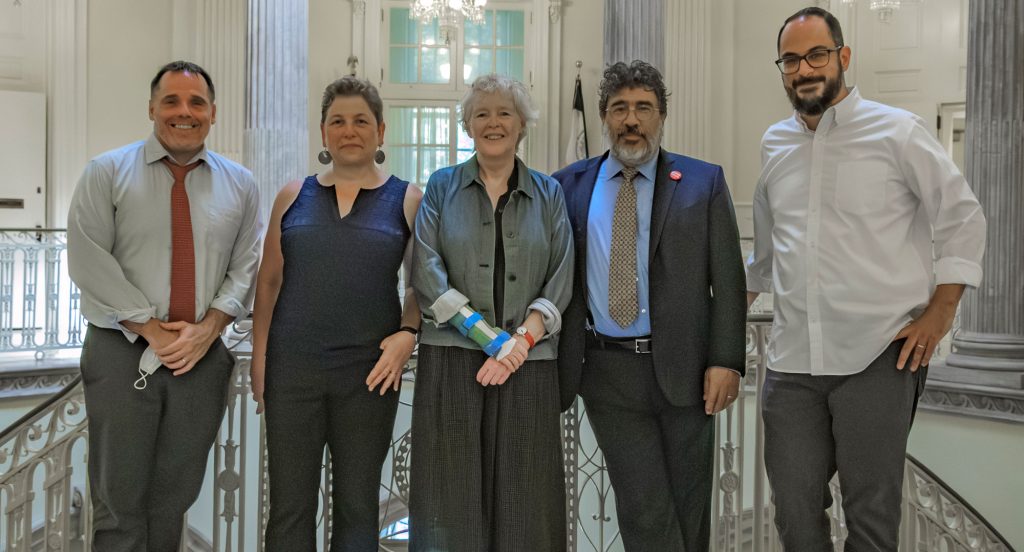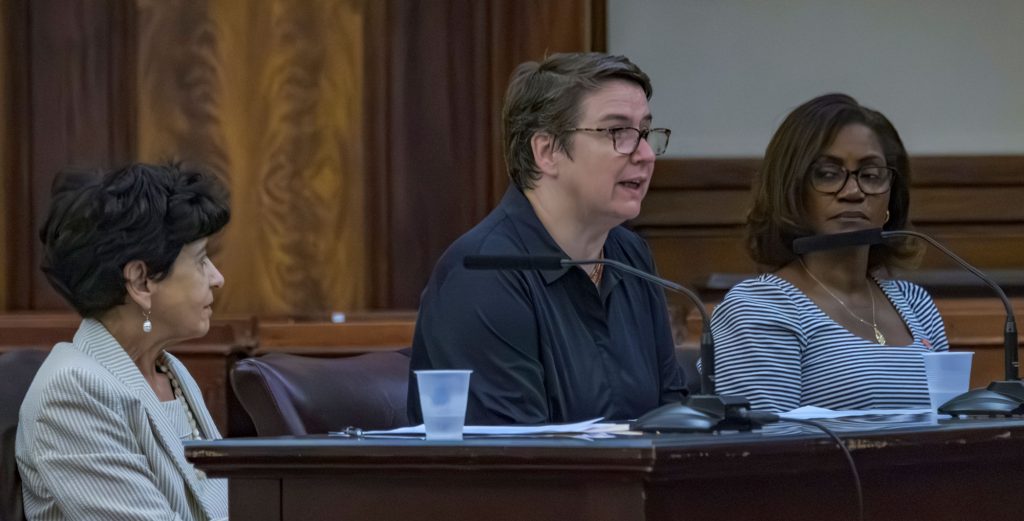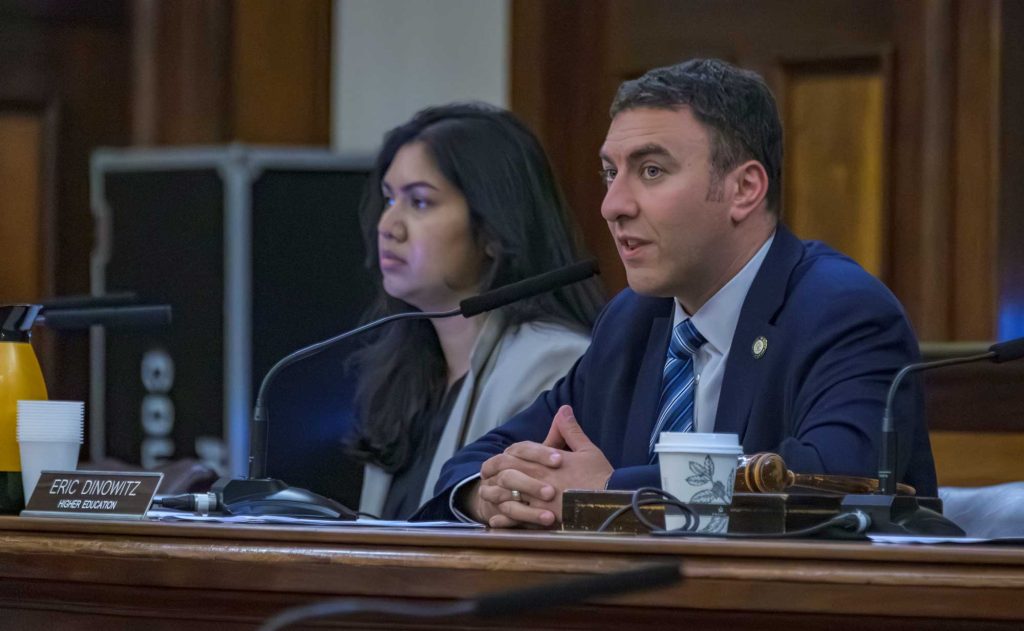
PSC panelists, from left: Alan Aja, Sarah Chinn, Barbara Bowen, Hugo Fernandez and Luke Waltzer. (Credit: Erik McGregor)
Humanities programs across the United States are under increasing threat. West Virginia University recently announced sweeping faculty layoffs, and as the Washington Post wrote, is “poised to jettison all of its faculty dedicated to teaching Spanish, French, Chinese and other foreign languages” and “is moving toward elimination of a master’s degree program in creative writing.” This past winter, The New Yorker reported on the dismal slide in humanities majors over the past decade.
Academics around the country note the trends indicating that the American public university system is increasingly devaluing the humanities in favor of workforce training. And widespread disinvestment raises the specter of cuts to the core mission of urban public higher education. New Jersey City University announced in a statement last year the “sunsetting of undergraduate majors and minors, graduate, certificate and doctoral programs, and the layoff and non-reappointment of faculty and some professional staff,” including the layoff of 30 tenured faculty members. CUNY administrators have continued cuts to the campuses while often touting new investment in the sciences and job training. Understandably, many worry what may become of CUNY’s commitments to language, arts and other important areas of study.
COUNCIL RESPONDS
However, at a City Council Committee on Higher Education hearing on September 6, Higher Education Chair Eric Dinowitz expressed the need for a public humanities education in higher education. It’s a theme he has, fortunately, promoted ever since he became chair of the committee. A former K-12 teacher and UFT member, he told Clarion after he became chair that he wanted CUNY to offer a continuum of education for public school graduates, and that includes a full humanities education.
In this context, CUNY administrators heaped praise on their university system’s many humanities programs and highlighted that it was central to CUNY’s mission. “Studying humanities is not a privilege for the wealthy, it is a right and a necessity for everyone,” said Karin Beck, associate dean of arts and humanities at Lehman College.
Several PSC members followed the CUNY administration testimony to drive home the importance of humanities at CUNY.
Luke Waltzer, the director of the Teaching and Learning Center at the Graduate Center, spoke about his program, where doctoral students have the opportunity to teach humanities at CUNY’s two-year colleges.
“Disciplinary training must be broad and porous rather than limited, and our students in all fields are exposed to a range of methodologies within and beyond their fields from which they assemble their tool kits,” he said in prepared testimony. “These transferable skills and commitments are required to thrive in the modern economy, and are passed through Graduate Center students to the thousands of CUNY undergraduates they teach. ‘Workforce development’ and ‘training in the humanities’ are not opposing ideas. Employers want to hire graduates who are well-rounded and who can communicate with various audiences effectively. The humanities are crucial to comprehension of the ethical dimensions of the drivers of economic development in the 21st century, including machine learning and artificial intelligence, health care and clean energy.”

Karin Beck (center) is the associate dean of arts and humanities at Lehman (Credit: Erik McGregor)
NATIONAL CONTEXT
Waltzer put all this in the national context, noting that New York City and CUNY, which is known internationally as “the people’s university,” can and must do better.
“It’s not news that trends in public higher education are hostile to the humanities and to the notion of liberal education more broadly, while wealthier private institutions deepen their investments in these areas,” he said. “Institutions like BYU-Idaho and Ensign College have approved 90-credit BAs in business management and applied health by eliminating general education requirements. At CUNY and in New York we have a choice: Do we want to follow these trends that narrow a degree into a vocational pursuit, or do we want to double down on our mission of access by seriously considering just what we’re giving the ‘children of the whole people’ access to. We must welcome them into institutions that are pathways to worlds of knowledge that simply can’t be accessed, comprehended or extended without a deep and enduring commitment to the humanities.”
Remy Salas, an adjunct lecturer in ethnic and race studies at Borough of Manhattan Community College, reiterated the idea that a broad humanities education is a part of general job training.
“The humanities foster critical thinking, analytical prowess and a profound sense of creativity. They empower students to explore the shared threads that bind humanity together while also highlighting the nuances that set us apart. Moreover, the humanities offer a wealth of practical applications that enhance one’s professional skill set,” Salas said. “Drawing from my personal experience as a former City Hall and city agency employee, serving in policy roles, I can attest to the indispensable role that my humanities education played in my early career trajectory. My proficiency in writing, honed through humanities coursework, greatly contributed to my professional advancement. As a dedicated professor, I have had the privilege of witnessing numerous students discover their own strengths and successfully apply them in academia and the professional area. A significant number of my former students have ventured into sectors such as technology and finance, where their global perspectives and effective communication skills have set them apart.”
FIERY STATEMENT
In fiery testimony, former PSC President Barbara Bowen, an associate professor of English at Queens College and the Graduate Center, said, “I hear two questions in the title of today’s hearing. First, whether studying the humanities, in an economy that worships technology and substitutes gig work for secure employment, can lead to a meaningful job. There is abundant proof that the answer to that question is yes. CUNY officials have supplied statistics, and survey after survey of employers shows that the qualities they value are the qualities nurtured by the humanities. We even have the president of Microsoft writing in 2018: ‘As computers behave more like humans, the social sciences and humanities will become more important.’”

Eric Dinowitz, chair of the City Council’s higher education committee, voices support for the humanities. (Credit: Erik McGregor)
NOT JUST FOR ELITES
Bowen added, “The second question I hear in today’s title, however, is disturbing. Humanities may be acceptable for students at elite institutions – students who already have the cushion of intergenerational wealth or who may not be endangered by the violence of systemic racism – but isn’t a major in philosophy or English an unaffordable luxury for a student at CUNY? The answer is no. If the measure of a ‘viable academic path’ is whether it leads to a job, then the evidence of the Queens College English department should be enough. Take a look at the department website; it profiles recent English majors who are now oncology nurses, attorneys, teachers, visual artists, journalists, video game writers, novelists and more.”
Speaking to Clarion, Sarah Chinn, a professor of English at Hunter College, noted that one major problem at CUNY is that because humanities don’t require heavy equipment or labs like the sciences do, the humanities can often be overlooked when it comes to being resourced.
“The humanities have suffered significant neglect,” she said. “There’s a sense that we don’t bring real prestige to the campus.”
During the hearing, Dinowitz asked PSC members what more could be done to improve the humanities at CUNY. Bowen made it clear that the problem was the general underfunding of CUNY and the chronic austerity on campuses throughout the city. At schools where classrooms don’t have enough desks or aren’t properly heated, where faculty are underpaid compared to faculty at peer institutions, Bowen said that the humanities were bound to suffer. What is needed, she said, was more robust funding of CUNY generally.
“What needs to be done is more investment in CUNY overall,” Bowen said. “The general austerity at CUNY is very heavily visited on the humanities.”
Published: September 27, 2023

